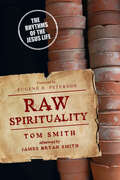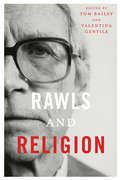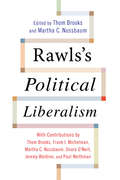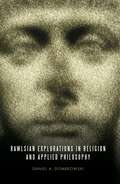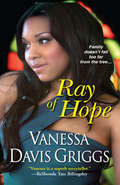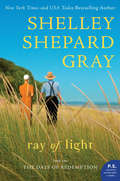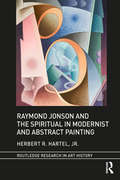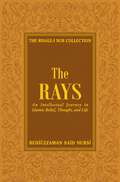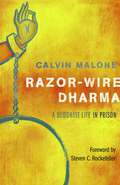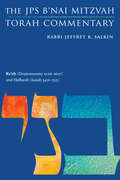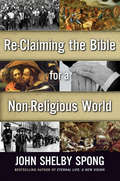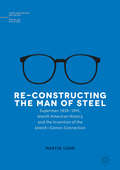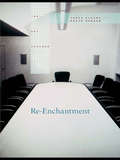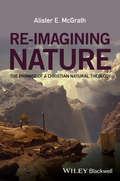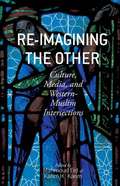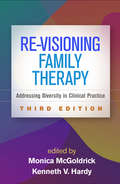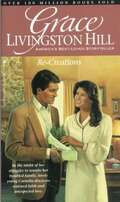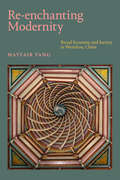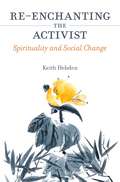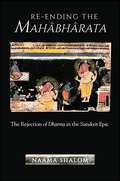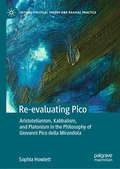- Table View
- List View
Raw Edges
by Sandra D. BrickerGrayson McDonough has no use for teal ribbons, 5k runs, or ovarian cancer support groups now that his beautiful wife Jenna is gone. But their nine-year-old daughter Sadie seems to need the connection. When Annabelle Curtis, the beautiful cancer survivor organizing the memory quilt project for the Ovacome support group, begins to bring out the silly and fun side of his precious daughter again, Gray must set aside his own grief to support the healing of Sadie's young heart. But is there hope for Gray's heart too along the way?
Raw Spirituality: The Rhythms of the Jesus Life (Renovare Resources)
by Tom SmithHave you ever felt a tension between developing your internal spiritual life and the call to outward service in the world? Those of us who are more naturally activists risk becoming bitter, tired and burned out. Those of us who gravitate toward the contemplative life may struggle to connect our spirituality with the world around us. How do we allow the life of Jesus to flow through our whole bodies into our everyday lives? This book is a result of how Tom Smith held these questions in tension, as Eugene H. Peterson reflects in his foreword: "There is a back story here that is helpful in understanding Tom Smith's fierce focus and energetic imagination. He grew up in South Africa during the years of apartheid. . . . He also was aware that the Rwanda genocide took place in a population mostly Christian. He became a pastor in a flourishing South African church and then came to North America. He experienced the temptation to degenerate church into a consumer program. . . . This book is a witness to what takes place when names trump numbers and stories with their accompanying metaphors keep relationships personal and prayerful." Having Jesus in our hearts is not enough. Jesus calls us to a spirituality that involves our everyday actions and interactions with others and extends our sphere of influence. In this raw, honest, whole-life approach to Christian formation, Tom Smith introduces us into a "rhythm of life" that that brings flourishing to our personal spirituality that then extends to our service in the world.
Rawls and Religion
by Tom Bailey Gentile ValentinaEstablished scholars of Rawls and the philosophy of religion reexamine and rearticulate the central tenets of Rawls's theory
Rawls and Religion
by Tom Bailey Valentina GentileJohn Rawls's influential theory of justice and public reason has often been thought to exclude religion from politics, out of fear of its illiberal and destabilizing potentials. It has therefore been criticized by defenders of religion for marginalizing and alienating the wealth of religious sensibilities, voices, and demands now present in contemporary liberal societies.In this anthology, established scholars of Rawls and the philosophy of religion reexamine and rearticulate the central tenets of Rawls's theory to show they in fact offer sophisticated resources for accommodating and responding to religions in liberal political life. The chapters reassert the subtlety, openness, and flexibility of his sense of liberal "respect" and "consensus," revealing their inclusive implications for religious citizens. They also explore the means he proposes for accommodating nonliberal religions in liberal politics, developing his conception of "public reason" into a novel account of the possibilities for rational engagement between liberal and religious ideas. And they reevaluate Rawls's liberalism from the "transcendent" perspectives of religions themselves, critically considering its normative and political value, as well as its own "religious" character. Rawls and Religion makes a unique and important contribution to contemporary debates over liberalism and its response to the proliferation of religions in contemporary political life.
Rawls's Political Liberalism (Columbia Themes in Philosophy)
by Martha C. Nussbaum Thom BrooksWidely hailed as one of the most significant works in modern political philosophy, John Rawls's Political Liberalism (1993) defended a powerful vision of society that respects reasonable ways of life, both religious and secular. These core values have never been more critical as anxiety grows over political and religious difference and new restrictions are placed on peaceful protest and individual expression.This anthology of original essays suggests new, groundbreaking applications of Rawls's work in multiple disciplines and contexts. Thom Brooks, Martha Nussbaum, Onora O'Neill (University of Cambridge), Paul Weithman (University of Notre Dame), Jeremy Waldron (New York University), and Frank Michelman (Harvard University) explore political liberalism's relevance to the challenges of multiculturalism, the relationship between the state and religion, the struggle for political legitimacy, and the capabilities approach. Extending Rawls's progressive thought to the fields of law, economics, and public reason, this book helps advance the project of a free society that thrives despite disagreements over religious and moral views.
Rawls, Political Liberalism and Reasonable Faith
by Paul WeithmanFor over twenty years, Paul Weithman has explored the thought of John Rawls to ask how liberalism can secure the principled allegiance of those people whom Rawls called 'citizens of faith'. This volume brings together ten of his major essays (including one new unpublished essay), which reflect on the task and political character of political philosophy, the ways in which liberalism does and does not privatize religion, the role of liberal legitimacy in Rawls's theory, and the requirements of public reason. The essays reveal Rawls as a thinker deeply engaged with political and existential questions that trouble citizens of faith, and explore how - in firm opposition to political realism - he tries to show that the possibility of liberal democracy and the natural goodness of humanity are objects of reasonable faith. The volume will be of interest to political philosophers, political theorists, moral theologians, and religious ethicists.
Rawlsian Explorations in Religion and Applied Philosophy (G - Reference, Information and Interdisciplinary Subjects)
by Daniel A. DombrowskiTo probe the underlying premises of a liberal political order, John Rawls felt obliged to use a philosophical method that abstracted from many of the details of ordinary life. But this very abstraction became a point of criticism, as it left unclear the implications of his theory for public policies and life in the real political world. Rawlsian Explorations in Religion and Applied Philosophy attempts to ferret out those implications, filling the gap between Rawls’s own empyrean heights and the really practical public policy proposals made by government planners, lobbyists, and legislators. Among the topics examined are natural rights, the morality of war, the treatment of mentally deficient humans and nonhuman sentient creatures, the controversies over legacy and affirmative action in college admissions, and the place of religious belief in a democratic society. The final chapter explores how Rawls’s own religious beliefs, as revealed in two works posthumously published in 2009, played into his formulation of his theory of justice.
Ray of Hope
by Vanessa Davis Griggs"Vanessa is a superb storyteller." --ReShonda Tate Billingsley"I absolutely love Vanessa's unique writing style. She is one of a kind." --Mary Monroe, New York Times bestselling authorTeen sisters Sahara and Crystal Nichols are acting up, and their risqué behavior is more than their mother can handle. Enter the girls' 75-year-old churchgoing grandmother, Ma Ray, who takes charge of the young women. She's determined to turn their lives around--and knows more about being a bad girl than either sister bargained for. And when they learn of their grandmother's former rebel antics, which were wild enough to rival their own, they begin to appreciate her present-day passion for leading a more productive life--via family, love, and faith. . ."There are enough tears, hugs, and lessons learned to appease readers, young and adult, who like a good dose of faith with their fiction." --Publishers Weekly
Ray of Light
by Shelley Shepard GrayWhen two hearts connect on a beach in Florida, is it a brief romance . . . or the start of a lasting love?After family secrets come to light, causing an uproar, Roman Keim is taking a much-needed vacation to Pinecraft, the Amish snowbird community in Florida. The warm weather is a welcome break from the bleak Ohio winter, as is a week off from all his familys drama. But Romans own drama begins when he meets his next-door neighbors: Amanda Yoder, a beautiful young widow, and her adorable daughter, Regina. In the two years since her husband died, Amanda has never looked at another man. She certainly doesnt intend to get married again. But she cant deny that theres something special between her and Roman. As his week in Pinecraft comes to a close, Amanda knows that, in spite of her attempt to remain distant, shes given Roman a piece of her heart. And her daughter seems to have fallen in love, too. Is there hope for a second chance at love for Amanda? Or will duty call Roman home first, far from the two women who have captured his heart?
Raymond Jonson and the Spiritual in Modernist and Abstract Painting (Routledge Research in Art History)
by Herbert R. Hartel, Jr.This is the most thorough and detailed monograph on the artwork of Raymond Jonson. He is one of many artists of the first half of the twentieth-century who demonstrate the richness and diversity of an under-appreciated period in the history of American art. Visualizing the spiritual was one of the fundamental goals of early abstract painting in the years before and during World War I. Artists turned to alternative spirituality, the occult, and mysticism, believing that the pure use of line, shape, color, light and texture could convey spiritual insight. Jonson was steadfastly dedicated to this goal for most of his career and he always believed that modernist and abstract styles were the most effective and compelling means of achieving it.
Rays
by Bediuzzaman Said NursiIMPORTANT NOTE: This publisher may alter and/or omit important sections from Risale-i Nur Collection. In order to obtain a translation that adhere to original Risale-i Nur Collection, please check other publishers. Providing a framework of Islamic thought for issues raised in modern times, this cornerstone volume offers important insight into matters of belief through a collection of arguments that assert the importance of a renewed faith in today&’s world. Stating that belief equals knowledge and that the convictions underlying nonbelief are ignorance and absence of judgment, this spirituality-affirming compendium features essays that introduce the pillars of faith for the Islamic tradition and give a broader understanding of Islam based on the Qur&’an. Ultimately hoping to prove the existence and unity of God, this magnum opus is perfect for researchers and students of Islam as well as anyone interested in a broad analysis of the Qur&’an and the main tenets of the Islamic faith.
Razor-Wire Dharma
by Calvin Malone Sunyana Graef Steven C RockefellerCalvin Malone has plenty to teach us all about ideas that we rarely associate with the penal system: Dignity. Compassion. Freedom behind bars. He speaks from experience: Malone is nearing the end of a 20-year prison sentence himself.Razor-Wire Dharma is his eloquent, enlightening, and utterly inspiring personal story how he found Buddhism--and real, transformative meaning for his life-despite being in one of the world's harshest environments.Some of his stories are hilarious, some are harrowing, but all express Buddhist wisdom as vividly as any practitioner could hope to do. Malone is living it, and in the unlikeliest of places. For him, the choice of staying true to his principles often requires that he quite literally jeopardize his life, safety, and the few small comforts available to him to try to do what's right.Razor-Wire Dharma makes it clear that if Calvin can do what's right in jail, he can do it anywhere. What's more, it proves that we can, too.
Re'eh: The JPS B'nai Mitzvah Torah Commentary (JPS Study Bible)
by Rabbi Jeffrey K. SalkinThe JPS B’nai Mitzvah Torah Commentary shows teens in their own language how Torah addresses the issues in their world. The conversational tone is inviting and dignified, concise and substantial, direct and informative. The narrative summaries, “big” ideas, model divrei Torah, haftarot commentaries, and discussion questions will engage teens in studying the Torah and haftarot, in writing divrei Torah, and in continuing to learn Torah throughout their lives. Re'eh includes: * General introduction * Two model divrei Torah on the weekly Torah portion. * One model davar Torah on the weekly Haftarah portion. Jewish learning—for young people and adults—will never be the same.
Re-Claiming the Bible for a Non-Religious World
by John Shelby SpongFor two hundred years, scholars have been analyzing one of the most important books ever written-the Bible-and overturning much of what we once thought we knew. Everyday Christians, however, are not privy to this deeper conversation. It is for these people that renowned bishop and author John Shelby Spong presents Re-Claiming the Bible for a Non-Religious World, a book designed to take readers into the contemporary academic debate about the Bible. A definitive voice for progressive Christianity, Spong frees readers from a literal view of the Bible. He opens the possibility that some of the characters in the New Testament are imaginary composites or even literary creations-such as Joseph, the earthly father of Jesus; Judas Iscariot; Nicodemus; the Samaritan woman by the well; and Lazarus who was raised from the dead. He presents the Bible as an ever-changing and always growing story. He demonstrates that it is possible to be both a deeply committed Christian and an informed twenty-first-century citizen. In this thorough, substantive guide, Spong explores the origin and essential meaning of each of the individual books in the Bible, examining the background, the context, the level of authenticity and even the trustworthiness of the messages found there. He explains why these particular books, written between two and three thousand years ago, came to be regarded as authoritative and preserved as sacred; he traces the pathway that biblical religion has traveled as it evolved through the centuries, and he shows how people have misused many of these texts in the service of their prejudices. Reaching far beyond the familiar Sunday-school stories that have provided the content of most people's biblical knowledge, Spong's journey into the heart of the Bible is his attempt to call his readers into their own journeys into the mystery of God. "One does not," he asserts, "have to twist one's brain into a first-century pretzel in order to take the Bible seriously in this increasingly non-religious world."
Re-Constructing the Man of Steel
by Martin LundIn this book, Martin Lund challenges contemporary claims about the original Superman's supposed Jewishness and offers a critical re-reading of the earliest Superman comics. Engaging in critical dialogue with extant writing on the subject, Lund argues that much of recent popular and scholarly writing on Superman as a Jewish character is a product of the ethnic revival, rather than critical investigations of the past, and as such does not stand up to historical scrutiny. In place of these readings, this book offers a new understanding of the Superman created by Jerry Siegel and Joe Shuster in the mid-1930s, presenting him as an authentically Jewish American character in his own time, for good and ill. On the way to this conclusion, this book questions many popular claims about Superman, including that he is a golem, a Moses-figure, or has a Hebrew name. In place of such notions, Lund offers contextual readings of Superman as he first appeared, touching on, among other ideas, Jewish American affinities with the Roosevelt White House, the whitening effects of popular culture, Jewish gender stereotypes, and the struggles faced by Jewish Americans during the historical peak of American anti-Semitism. In this book, Lund makes a call to stem the diffusion of myth into accepted truth, stressing the importance of contextualizing the Jewish heritage of the creators of Superman. By critically taking into account historical understandings of Jewishness and the comics' creative contexts, this book challenges reigning assumptions about Superman and other superheroes' cultural roles, not only for the benefit of Jewish studies, but for American, Cultural, and Comics studies as a whole.
Re-Enchantment (The Art Seminar)
by David Morgan James ElkinsThe near-absence of religion from contemporary discourse on art is one of the most fundamental issues in postmodernism. Artists critical of religion can find voices in the art world, but religion itself, including spirituality, is taken to be excluded by the very project of modernism. The sublime, "re-enchantment" (as in Weber), and the aura (as in Benjamin) have been used to smuggle religious concepts back into academic writing, but there is still no direct communication between "religionists" and scholars. Re-Enchantment, volume 7 in The Art Seminar Series, will be the first book to bridge that gap. The volume will include an introduction and two final, synoptic essays, as well as contributions from some of the most prominent thinkers on religion and art including Boris Groys, James Elkins, Thierry de Duve, David Morgan, Norman Girardot, Sally Promey, Brent Plate, and Christopher Pinney.
Re-Imagining Nature: The Promise of a Christian Natural Theology
by Alister E. McgrathReimagining Nature is a new introduction to the fast developing area of natural theology, written by one of the world's leading theologians. The text engages in serious theological dialogue whilst looking at how past developments might illuminate and inform theory and practice in the present. This text sets out to explore what a properly Christian approach to natural theology might look like and how this relates to alternative interpretations of our experience of the natural world Alister McGrath is ideally placed to write the book as one of the world's best known theologians and a chief proponent of natural theology This new work offers an account of the development of natural theology throughout history and informs of its likely contribution in the present This feeds in current debates about the relationship between science and religion, and religion and the humanities Engages in serious theological dialogue, primarily with Augustine, Aquinas, Barth and Brunner, and includes the work of natural scientists, philosophers of science, and poets
Re-Imagining the Other Culture, Media, and Western-Muslim Intersections
by Mahmoud Eid Karim H. KarimThe twenty-first century exploded into the global imagination with unforgettable scenes of death and destruction. An apocalyptic 'clash of civilizations' seemed to be waged between two old foes - 'the West' and 'Islam. ' However, the decade-long and ruinous 'war on terror' has prompted re-assessments of the militaristic approach to Western-Muslim relations. A growing number of academics, policymakers, religious leaders, journalists, and activists view the struggles as resulting from a 'clash of ignorance. ' Re-imagining the Other examines the ways in which knowledge is manipulated by dominant Western and Muslim discourses. Authors from several disciplines study how the two societies have constructed images of each other in historical and contemporary times. The complexities and subtleties of their mutually productive relationship are overshadowed by portrayals of unremitting clash, thus serving as encouragement for the promotion of war and terrorism. The book proposes specific approaches to re-imagine the Other in order to mitigate Western-Muslim conflict.
Re-Visioning Family Therapy, Third Edition: Addressing Diversity in Clinical Practice
by Kenneth V. Hardy Monica McGoldrickA leading text for courses that go beyond the basics of family systems theory, intervention techniques, and diversity, this influential work has now been significantly revised with 65% new material. The volume explores how family relationships--and therapy itself--are profoundly shaped by race, social class, gender, religion, sexual orientation, and other intersecting dimensions of marginalization and privilege. Chapters from leading experts guide the practitioner to challenge assumptions about family health and pathology, understand the psychosocial impact of oppression, and tap into clients' cultural resources for healing. Practical clinical strategies are interwoven with theoretical insights, case examples, training ideas, and therapists' reflections on their own cultural and family legacies. New to This Edition *Existing chapters have been thoroughly updated and 21 chapters added, expanding the perspectives in the book. *Reflects over a decade of theoretical and clinical advances and the growing diversity of the United States. *New sections on re-visioning clinical research, trauma and psychological homelessness, and larger systems.
Re-creations (Grace Livingston Hill #89)
by Grace Livingston HillWhen lovely Cornelia Copley's mother becomes ill, Cornelia must leave her beloved college and return home to care for her family. But things at home have changed a great deal. Her family is living in near poverty in a shabby and dismal little house. And her younger brother has become rebellious and distant. Cornelia is filled with dismay and self-pity. Then she overhears her youngest brother and her sister calling her self-centered and ungrateful. Suddenly Cornelia realizes that what they are saying is true— she has only been making matters worse! So she devises a strategy to repair the damage she has caused. But is it too late? Can Cornelia find the right way to bring her precious family together again and bring them a renewed sense of faith and hope? There are 85 Books by Grace Livingston Hill in Bookshare's library with more on the way. America’s Best-loved storyteller is the beloved author of more than 100 books. Read and enjoyed by millions, her wholesome stories contain adventure, romance, and the heartwarming triumphs of people faced with the problems of life and love.
Re-enchanting Modernity: Ritual Economy and Society in Wenzhou, China
by Mayfair YangIn Re-enchanting Modernity Mayfair Yang examines the resurgence of religious and ritual life after decades of enforced secularization in the coastal area of Wenzhou, China. Drawing on twenty-five years of ethnographic fieldwork, Yang shows how the local practices of popular religion, Daoism, and Buddhism are based in community-oriented grassroots organizations that create spaces for relative local autonomy and self-governance. Central to Wenzhou's religious civil society is what Yang calls a "ritual economy," in which an ethos of generosity is expressed through donations to temples, clerics, ritual events, and charities in exchange for spiritual gain. With these investments in transcendent realms, Yang adopts Georges Bataille's notion of "ritual expenditures" to challenge the idea that rural Wenzhou's economic development can be described in terms of Max Weber's notion of a "Protestant Ethic". Instead, Yang suggests that Wenzhou's ritual economy forges an alternate path to capitalist modernity.
Re-enchanting the Activist: Spirituality and Social Change
by Keith HebdenAcross the world, grassroots movements for change are growing in number, skill, and impact on society. Finding a place at the intersect between spirituality and politics, these emerging activists are grounded in a deeper understanding of the world they wish to change, and act out of a deep sense that their simple acts can make a difference. With moving first-hand accounts, priest and community organiser Keith Hebden demonstrates what it means to be an engaged and alive human being in a world that is crying out for change, and how to play our part in it. Whether you have recently come alive to the possibilities of activism, or are familiar with the frustrations and challenges of working for change, this book will energise, inform and enchant you.
Re-enchanting the Activist: Spirituality and Social Change
by Keith HebdenAcross the world, grassroots movements for change are growing in number, skill, and impact on society. Finding a place at the intersect between spirituality and politics, these emerging activists are grounded in a deeper understanding of the world they wish to change, and act out of a deep sense that their simple acts can make a difference. With moving first-hand accounts, priest and community organiser Keith Hebden demonstrates what it means to be an engaged and alive human being in a world that is crying out for change, and how to play our part in it. Whether you have recently come alive to the possibilities of activism, or are familiar with the frustrations and challenges of working for change, this book will energise, inform and enchant you.
Re-ending the Mahābhārata: The Rejection of Dharma in the Sanskrit Epic (SUNY series in Hindu Studies)
by Naama ShalomThis book challenges two prevalent assumptions about the Mahābhārata: that its narrative is inherently incapable of achieving a conclusion and that its ending, the Svargārohaṇa parva, is an extraneous part of the text. While the exegetic traditions have largely tended to suppress, ignore, or overlook the importance of this final section, Shalom argues that the moment of the condemnation of dharma that occurs in the Svargārohaṇa parva, expressed by the epic protagonist, Yudhiṣṭhira, against his father, Dharma, is of crucial importance. It sheds light on the incessant preoccupation and intrinsic dismay towards the concept of dharma (the cardinal theme around which the epic revolves) expressed by Mahābhārata narrators throughout the epic, and is thus highly significant for understanding the Mahābhārata narrative as a whole.
Re-evaluating Pico: Aristotelianism, Kabbalism, and Platonism in the Philosophy of Giovanni Pico della Mirandola (Critical Political Theory and Radical Practice)
by Sophia HowlettThis book offers a re-evaluation of Giovanni Pico della Mirandola, the prominent Italian Renaissance philosopher and prince of Concord. It argues that Pico is part of a history of attempted concordance between philosophy and theology, reason and faith. His contribution is a syncretist theological philosophy based on Christianity, Platonism, Aristotelianism and Jewish Kabbalism. After an introduction, Chapter 2 discusses Pico’s career, his power-relations and his work, Chapters 3 and 4 place his three pillars of Platonism, Aristotelianism and Kabbalism in their historical context, examines shared histories, and introduces the scholars around Pico who contributed so much in each of these traditions (introducing, for example, Christian Kabbalism), including exploring Pico's complex relationship with Marsilio Ficino. Chapter 5 examines the problems of concordance within Pico’s cosmology and metaphysics, including the question of God and the role of the Intellect. Chapter 6 describes Pico’s ‘exceptionalist’ version of the mystical ascent as an individualized ascetic experience. Pico eschews the contemporary desire to use a renewed christian thinking or christian-classical metaphysics to change the world (towards a Golden Age or a 'second coming') to present a personal path to God, with no return to the world.

